每日新闻(11.23)-索马里海盗当好莱坞电影变成现实-每日英语课堂.doc
红海行动英语作文带翻译
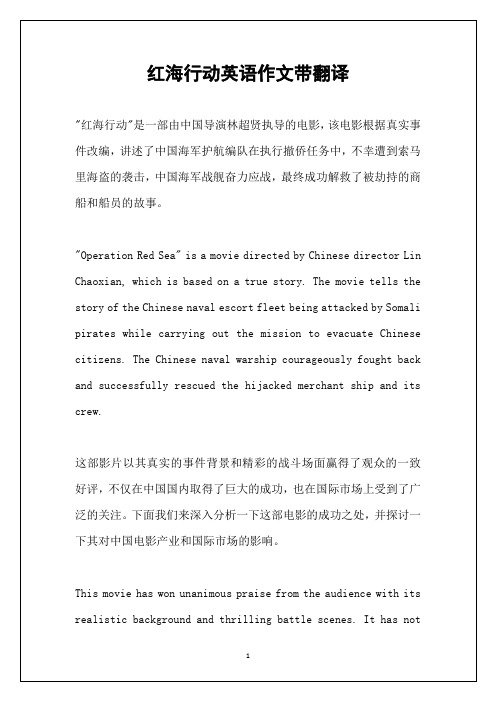
Finally, "Operation Red Sea" has successfully pushed Chinese films into the international market. As a movie that brings together a powerful production team in China, "Operation Red Sea" has shown the strength and potential of the Chinese film industry to the world, and has received unanimous praise from international audiences. At the same time, the movie's international box office revenue also proves the competitiveness of Chinese films in the international market.
这部影片以其真实的事件背ቤተ መጻሕፍቲ ባይዱ和精彩的战斗场面赢得了观众的一致好评,不仅在中国国内取得了巨大的成功,也在国际市场上受到了广泛的关注。下面我们来深入分析一下这部电影的成功之处,并探讨一下其对中国电影产业和国际市场的影响。
This movie has won unanimous praise from the audience with its realistic background and thrilling battle scenes. It has notonly achieved great success in China, but also attracted wide attention in the international market. Now let's take a closer look at the success of this movie and its impact on the Chinese film industry and the international market.
Internation news国际新闻演示PPT

Criticism
Criticism
2 《Category 7: The End of the World 》 in reality Xinhua net reported on Apr 18 that over 120 tornadoes hit se veral states starting in Oklahoma and Arkansas, raging th rough North Carolina, Texas and several other areas. At l east 43 fatalities have been confirmed.
ቤተ መጻሕፍቲ ባይዱ
Character
2 The third most beautiful royal women Kate Middleton to become ‘third most beautiful royal in hist ory’ . Prince William and Kate Middleton are to marry at Westminster Abbey on April 29, 2011.
Scott
News synopsis
Criticism Character
1 Somali pirates (索马里海盗 索马里海盗)are wealthier than us 索马里海盗 British "Sunday Independent " reported on Apr 17 that at least 1,500 Somali pirates current estimates, due to substantial "career rewards", reported that a Somali pirate income $ 79,000 a year, Somali pirates or by the global economic losses in 2015 $ 15billions.
somalia索马里海盗
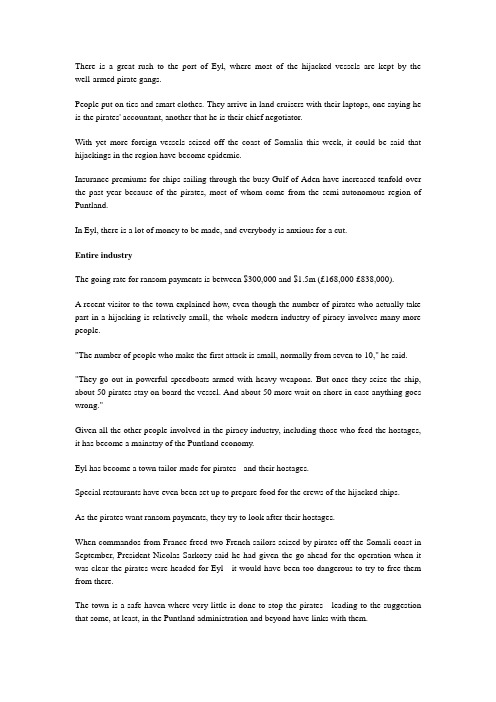
There is a great rush to the port of Eyl, where most of the hijacked vessels are kept by the well-armed pirate gangs.People put on ties and smart clothes. They arrive in land cruisers with their laptops, one saying he is the pirates' accountant, another that he is their chief negotiator.With yet more foreign vessels seized off the coast of Somalia this week, it could be said that hijackings in the region have become epidemic.Insurance premiums for ships sailing through the busy Gulf of Aden have increased tenfold over the past year because of the pirates, most of whom come from the semi-autonomous region of Puntland.In Eyl, there is a lot of money to be made, and everybody is anxious for a cut.Entire industryThe going rate for ransom payments is between $300,000 and $1.5m (£168,000-£838,000).A recent visitor to the town explained how, even though the number of pirates who actually take part in a hijacking is relatively small, the whole modern industry of piracy involves many more people."The number of people who make the first attack is small, normally from seven to 10," he said."They go out in powerful speedboats armed with heavy weapons. But once they seize the ship, about 50 pirates stay on board the vessel. And about 50 more wait on shore in case anything goes wrong."Given all the other people involved in the piracy industry, including those who feed the hostages, it has become a mainstay of the Puntland economy.Eyl has become a town tailor-made for pirates - and their hostages.Special restaurants have even been set up to prepare food for the crews of the hijacked ships.As the pirates want ransom payments, they try to look after their hostages.When commandos from France freed two French sailors seized by pirates off the Somali coast in September, President Nicolas Sarkozy said he had given the go-ahead for the operation when it was clear the pirates were headed for Eyl - it would have been too dangerous to try to free them from there.The town is a safe-haven where very little is done to stop the pirates - leading to the suggestion that some, at least, in the Puntland administration and beyond have links with them.Many of them come from the same clan - the Majarteen clan of the president of Somalia's transitional federal government, Abdullahi Yusuf.Money to spendThe coastal region of Puntland is booming.Fancy houses are being built, expensive cars are being bought - all of this in a country that has not had a functioning central government for nearly 20 years.Observers say pirates made about $30m from ransom payments last year - far more than the annual budget of Puntland, which is about $20m.When the president of Puntland, Adde Musa, was asked about the reported wealth of pirates and their associates, he said: "It's more than true".Now that they are making so much money, these 21st Century pirates can afford increasingly sophisticated weapons and speedboats.This means that unless more is done to stop them, they will continue to plunder the busy shipping lanes through the Gulf of Aden.They even target ships carrying aid to feed their compatriots - up to a third of the population.Warships from France, Canada and Malaysia, among others, now patrol the Somali coast to try and fend off pirate attacks.An official at the International Maritime Organisation explained how the well-armed pirates are becoming increasingly bold.More than 30% of the world's oil is transported through the Gulf of Aden."It is only a matter of time before something horrible happens," said the official."If the pirates strike a hole in the tanker, and there's an oil spill, there could be a huge environmental disaster".It is likely that piracy will continue to be a problem off the coast of Somalia as long as the violence and chaos continues on land.Conflict can be very good for certain types of business, and piracy is certainly one of them.Weapons are easy to obtain and there is no functioning authority to stop them, either on land or at sea.Somalia pirates hold U.S. captainAmerican seamen on the Maersk Alabama cargo ship manage to fend off the attackers, but they escape in a lifeboat with the captain as a hostage.By Edmund Sanders and Julian E. BarnesApril 9, 2009Reporting from Washington and Nairobi, Kenya -- With a U.S. warship on site keeping watch early today, Somali pirates and American seamen engaged in a standoff on the high seas after the crew of a freighter loaded with food for Africa fought off the hijackers -- who fled in a lifeboat with the captain as a hostage.The assault on the U.S.- registered Maersk Alabama cargo ship far off Somalia's coast marked the first attack against a U.S.-flagged vessel off Africa since the days of the Barbary pirates more than 200 years ago, a maritime official said.The 20-member crew, unarmed, according to the ship's owner, managed to overpower at least four pirates and regain control, U.S. officials said. But the captain, 55-year-old Vermont resident Richard Phillips, was being held by the pirates, a U.S. Defense official said.The attempted seizure of the Danish-owned vessel marks the latest chapter in the piracy saga off Somalia. Poverty, civil war and the lack of a functioning government since 1991 have turned the waters around the Horn of Africa nation into the most crime- infested on Earth.The attack on the cargo ship was the second in two days, U.S. officials said. After rebuffing the first attempt, the ship's crew radioed Wednesday that two skiffs were closing in. Thirty minutes later, the ship told maritime officials that pirates had attached a grappling hook and were climbing aboard.It remained unclear how the American crew retook the ship, and with Phillips in pirate hands, second-in-command Shane Murphy was in control. A crew member told CNN that one of the pirates had been detained, but then was released in an unsuccessful bid to exchange him for the captain.U.S. Defense Department officials said the U.S. destroyer Bainbridge arrived on the scene early today and was monitoring the situation. Navy P-3 surveillance planes also were keeping watch.Officials said the destroyer would establish communication, watch the situation and seek to negotiate the hostage's release, which could take some time."I wouldn't expect it to resolve itself like an episode of "CSI" in 45 minutes," a Defense official said. Both Murphy and Phillips are graduates of the Massachusetts Maritime Academy, where Murphy'sfather teaches a course in anti-piracy tactics. Academy President Rick Gurnon said it was his understanding that the crew had disabled the cargo ship in a bid to thwart the hijackers.Phillips' sister-in-law, Lea Coggio, described him as "easygoing, laid-back," and added that she wouldn't be surprised if he was having a relaxed conversation with the pirates.Numerous merchant vessels have successfully fended off or outrun pirates, but the actions of the U.S. crew appeared to mark a rare instance of seafarers overpowering pirates after a ship was seized, maritime officials said.It remained unclear who attacked the 17,000-ton vessel, but past attacks have been launched by Somali warlords, disgruntled fishermen and foreign-based criminal networks. After chasing ships in speed boats and scaling the ships' hulls, Somali pirates typically anchor vessels off the coast and negotiate ransoms of $1 million to $3 million.Last year, pirates attacked 122 vessels in the region and seized 42 of them. Total ransom payments collected by Somali pirates were believed to have topped $50 million. Maritime officials say at least 16 ships and 200 crew members are being held.Among high-profile attacks last year was one against a Ukrainian vessel carrying 33 military tanks and another targeting a Saudi-owned tanker carrying $100 million worth of crude oil.Pirates attacked the Maersk Alabama about 7:30 a.m., U.S. Navy officials said. The ship was in the Indian Ocean about 240 nautical miles southeast of the Somalia port city of Eyl, they said.The ship's owner, Norfolk, Va.-based Maersk Line, is a U.S. subsidiary of Denmark's A.P.Moller-Maersk. The shipping giant is a longtime Pentagon contractor, according to security analyst firm Global , operating vessels with "top security clearance." But the hijacked vessel was not sailing under a Defense Department contract at the time of the attack, company and U.S. military officials said.Maersk Line Chief Executive John Reinhart said at a news conference that the company's seafarers were trained in prevention methods to combat piracy, such as increasing the ship's speed or changing direction, preventing pirates from boarding, using extra lookouts and maintaining regular communication with the U.S. Navy."We have ways to push back, but we don't carry arms," he said.A spokesman for the World Food Program confirmed that part of the ship's cargo was being ferried on its behalf, including 4,000 metric tons of corn headed for Somalia and Uganda, and 1,000 metric tons of vegetable oil for refugees in Kenya. It was expected to dock in the Kenyan port of Mombasa on April 16.。
VOA英语教学
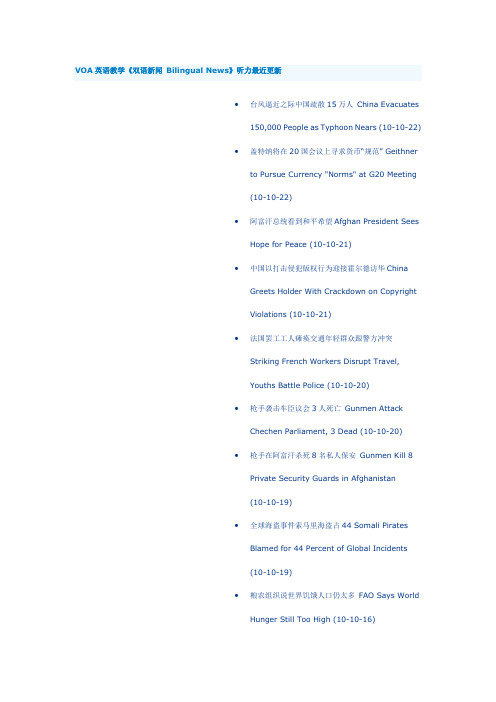
VOA英语教学《双语新闻Bilingual News》听力最近更新•台风逼近之际中国疏散15万人China Evacuates150,000 People as Typhoon Nears (10-10-22)•盖特纳将在20国会议上寻求货币“规范” Geithnerto Pursue Currency "Norms" at G20 Meeting(10-10-22)•阿富汗总统看到和平希望Afghan President SeesHope for Peace (10-10-21)•中国以打击侵犯版权行为迎接霍尔德访华ChinaGreets Holder With Crackdown on CopyrightViolations (10-10-21)•法国罢工工人瘫痪交通年轻群众跟警方冲突Striking French Workers Disrupt Travel,Youths Battle Police (10-10-20)•枪手袭击车臣议会3人死亡Gunmen AttackChechen Parliament, 3 Dead (10-10-20)•枪手在阿富汗杀死8名私人保安Gunmen Kill 8Private Security Guards in Afghanistan(10-10-19)•全球海盗事件索马里海盗占44 Somali PiratesBlamed for 44 Percent of Global Incidents(10-10-19)•粮农组织说世界饥饿人口仍太多FAO Says WorldHunger Still Too High (10-10-16)•美国将决定中国是不是汇率操纵国US to Decide if China is Manipulating Currency (10-10-16) •五名北约军人在阿富汗丧生5 NATO Soldiers Killed in Afghanistan (10-10-15)•台湾将使色情业合法化Taiwan to Legalize Sex Trade (10-10-15)•克林顿在科索沃受到群众热烈欢迎Clinton Greeted by Cheering Throngs in Kosovo(10-10-14)•智利11名被困矿工得救11 Rescued From Chile Mine (10-10-14)•北约直升机在阿富汗遭致命榴弹攻击Deadly Grenade Attack on NATO Helicopter inAfghanistan (10-10-13)•乌克兰巴士与火车相撞41人丧生Bus-Train Collision in Ukraine Kills 41 (10-10-13)•08年杀害青少年的希腊警官被判终身监禁Greek Officer Sentenced to Life for 2008 Teen Killing (10-10-12)•奥巴马将在佛罗里达号召支持人群Obama to Rally Supporters in Florida (10-10-12)•索马里海盗在非洲近海劫持船只Pirates Hijack Vessel Off Africa Coast (10-10-9)•美联社:北韩官员证实继任人选AP: North Korean Official Confirms Succession (10-10-9)•肯尼亚1千多教师因性骚扰被开除More Than 1,000 Teachers in Kenya Fired for SexualAbuse (10-10-8)•卡尔扎伊创立阿富汗和平委员会Karzai Launches Afghan Peace Council (10-10-8)•抽烟猩猩在南非动物园去世SmokingChimpanzee Dies in S.Africa Zoo (10-10-7) •在也门英国外交官和一法国人遭袭击Assailants in Yemen Attack British Diplomats, Frenchman(10-10-7)•厄瓜多尔提高安全部队工资Ecuador Raises Security Forces' Pay (10-10-6)•有毒废料侵袭匈牙利城镇造成3人死亡Toxic Waste Spill Floods Hungarian Towns, Kills 3(10-10-6)•美日告诫旅行者英国升高警戒级别US, Japan Caution Travelers; Britain Hikes Terror Alert(10-10-5)•英国科学家获诺贝尔医学奖Nobel Prize in Medicine Goes to British Scientist (10-10-5) •以色列总理称肩负“和平使命” Israeli PM Has a 'Mission of Peace" (10-10-2)•尼日利亚独立日活动现场附近7人被炸死7 Killed in Blasts Near Nigeria IndependenceCelebration (10-10-2)•日本力促第四个被扣押的日本人获释Japan to Press for Release of Fourth Detainee(10-10-1)•中国采取行动给房地产市场降温China Moves to Cool Housing Market (10-10-1)•富豪盖茨和巴菲特向中国富豪推广慈善Billionaires Gates, Buffett Selling Philanthropy to China's Richest (10-9-30)•美国国会将表决中国货币动议US Congress to Vote on China Currency Measure (10-9-30) •北韩执政的劳动党代表大会开幕North Korea Opens Ruling Party Convention (10-9-29) •以色列海军拦截加沙附近海上活动人士Israeli Navy Intercepts Boatload of Activists NearGaza (10-9-29)•美国否认参与索马里直升机袭击US Denies Involvement in Somalia Helicopter Attack(10-9-28)•奥巴马:不是没有就业的经济恢复Obama: Recovery Not Jobless (10-9-28)•伊朗随时准备参加“公平”的核谈判Iran Ready for 'Fair' Nuclear Talks (10-9-25)•巴基斯坦要求美国遣返被监禁的女科学家Pakistan Wants Jailed Scientist Repatriated (10-9-25)•罢工影响法国铁路和航空旅行Strikes Hit French Rail and Air Travel (10-9-24)•中国否认禁止向日本出口的报道China denies ban on specialized minerals exports to Japan (10-9-24)•联合国推出400亿美元健康计划U.N. Launches40 Billion Global Health Campaign (10-9-23) •伊朗阅兵遭炸弹袭击10人丧生Bomb Attack Kills10 at Iran Military Parade (10-9-23)•参议院将表决同性恋军人的立法Senate to Vote on Gays in Military Legislation (10-9-22) •欧盟支持遣返非法巴基斯坦移民的协议EU Backs Deal to Deport Illegal Pakistanis (10-9-22) •菲律宾高官在人质事件调查中被点名TopPhilippine Officials Named in Hostage Probe(10-9-21)•印度火车相撞21人亡Indian Train Crash Kills21 (10-9-21)•菲律宾总统接到人质对峙报告PhilippinePresident Receives Report on HostageStandoff (10-9-18)•中国:对汇率施压不会有帮助China Says Pressure Over Currency Not Helpful (10-9-17)•美国国务卿克林顿会晤阿巴斯Clinton Meets with Abbas after Inconclusive Peace Talks(10-9-17)•美国说在恢复北韩核会谈上不可能取得快速进展US Says No Quick Progress Likely onResuming North Korea Nuclear Talks(10-9-16)•日本干预外汇市场Japan Intervenes in Foreign Currency Market (10-9-16)•全世界饥饿人口下降到10亿以下Number of World's Hungry Drops Below 1 Billion(10-9-15)•伊朗前总统说制裁不是‘笑话’ Iran's Former President Says Sanctions Are No 'Joke'(10-9-15)•海峡两岸计划举行联合海上搜救演习Taiwan, China Planning Joint Maritime Exercise(10-9-14)•联合国指控伊朗阻碍核核查UN Accuses Iran of Hampering Nuclear Inspections (10-9-14) •奥巴马重申穆斯林有权建纽约清真寺Obama Reiterates Support For Muslims' Right to Build NY Mosque (10-9-11)•佛罗里达牧师说不打算在9月11日焚烧古兰经Florida Minister Says Not Planning to BurnQuran on Sept 11 (10-9-11)•俄罗斯市场爆炸造成至少15人丧生Russian Market Explosion Kills at Least 15 (10-9-10)。
索马里海盗事件英语作文
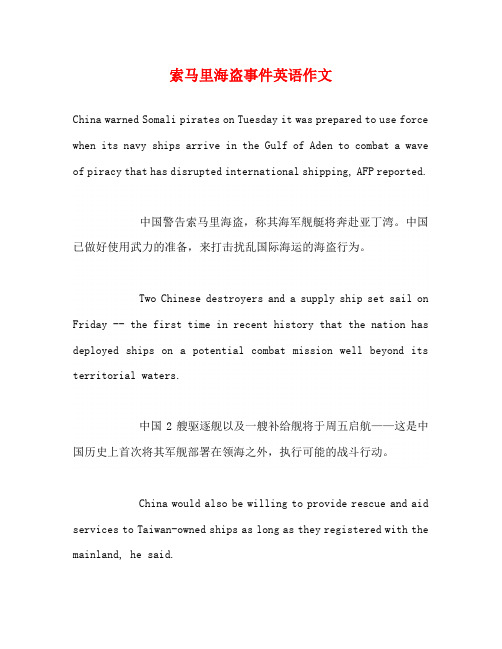
索马里海盗事件英语作文China warned Somali pirates on Tuesday it was prepared to use force when its navy ships arrive in the Gulf of Aden to combat a wave of piracy that has disrupted international shipping, AFP reported.中国警告索马里海盗,称其海军舰艇将奔赴亚丁湾。
中国已做好使用武力的准备,来打击扰乱国际海运的海盗行为。
Two Chinese destroyers and a supply ship set sail on Friday -- the first time in recent history that the nation has deployed ships on a potential combat mission well beyond its territorial waters.中国2艘驱逐舰以及一艘补给舰将于周五启航——这是中国历史上首次将其军舰部署在领海之外,执行可能的战斗行动。
China would also be willing to provide rescue and aid services to Taiwan-owned ships as long as they registered with the mainland, he said.中国将很乐意为在大陆注册的台湾船只提供援助。
About 100 ships -- seven of them Chinese -- have been attacked by Somali pirates since the beginning of the year.今年年初以来,约有100多条船——有7艘是中国船只——遭到了索马里海盗的袭击At least one Chinese vessel is believed still to be in the hands of the attackers.至少有一艘中国船只已确定落入了袭击者之手。
关于索马里海盗的五篇英文报道
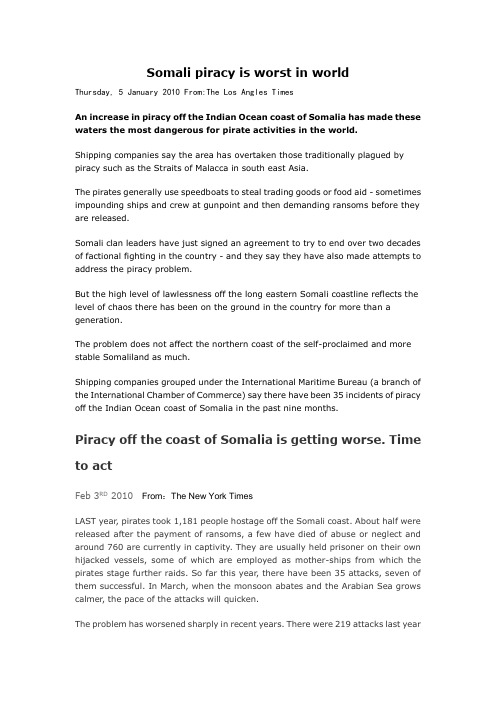
Somali piracy is worst in worldThursday, 5 January 2010 From:The Los Angles TimesAn increase in piracy off the Indian Ocean coast of Somalia has made these waters the most dangerous for pirate activities in the world.Shipping companies say the area has overtaken those traditionally plagued by piracy such as the Straits of Malacca in south east Asia.The pirates generally use speedboats to steal trading goods or food aid - sometimes impounding ships and crew at gunpoint and then demanding ransoms before they are released.Somali clan leaders have just signed an agreement to try to end over two decades of factional fighting in the country - and they say they have also made attempts to address the piracy problem.But the high level of lawlessness off the long eastern Somali coastline reflects the level of chaos there has been on the ground in the country for more than a generation.The problem does not affect the northern coast of the self-proclaimed and more stable Somaliland as much.Shipping companies grouped under the International Maritime Bureau (a branch of the International Chamber of Commerce) say there have been 35 incidents of piracy off the Indian Ocean coast of Somalia in the past nine months.Piracy off the coast of Somalia is getting worse. Time to actFeb 3RD 2010 From:The New York TimesLAST year, pirates took 1,181 people hostage off the Somali coast. About half were released after the payment of ransoms, a few have died of abuse or neglect and around 760 are currently in captivity. They are usually held prisoner on their own hijacked vessels, some of which are employed as mother-ships from which the pirates stage further raids. So far this year, there have been 35 attacks, seven of them successful. In March, when the monsoon abates and the Arabian Sea grows calmer, the pace of the attacks will quicken.The problem has worsened sharply in recent years. There were 219 attacks last yearcompared with 35 in 2005. Ransoms paid last year climbed to $238m, an average of $5.4m per ship, compared with $150,000 in 2005. At the end of last month Jack Lang, a former French minister who advises the UN on piracy, warned the Security Council that Somali pirates were becoming the “masters” of the Indian Ocean. He puts the economic cost of piracy at $5 billion-7 billion a year (see article). The price in human misery is unquantifiable.However, eradicating Somali piracy is as hard as it is desirable. Because Somalia is not a functioning state, the pirates can operate freely from their harbours in the north, mostly in the breakaway territory of Puntland. Although ships from over 25 countries patrol the area and maritime law equips naval vessels off the Horn of Africa with powers of arrest, bringing pirates to justice is frustrated by cost, restrictive rules of engagement and politics. Hence 90% of captured pirates are released quickly and without sanction. And the foreign patrols’ effectiveness is declining as the pirates move ever farther offshore.There are many suggested remedies, some bad. Outlawing ransoms is neither feasible nor in the hostages’ interests. Stationing armed guards on vessels or training crews to use firearms would only provoke a more brutal response from the pirates. Applying the historic cure for piracy—exemplary violence—would lead to many more dead hostages.The successful campaign against the pirates who caused mayhem in the Malacca Strait a decade ago suggests that the answer lies onshore rather than offshore. Malaysia, Indonesia and Singapore agreed to bury their differences and work together—patrolling, arresting, prosecuting and imprisoning pirates. At the same time as the risks for the pirates increased, conditions on shore improved. The post-tsunami peace settlement between the Indonesian government and rebels in Aceh, where most of the pirates came from, paved the way for investment, economic development and a better way of life.Suddenly, a Rise in Piracy’s Price5 Dec 2011 From: GuardianAt some point, Thomas Jefferson realized, you just can’t do bu siness with pirates any more. For years, the infant American government, along with many others, had accepted the humiliating practice of paying tribute —essentially mob-style protection fees —to a handful of rulers in the Barbary states so that American ships crossing the Mediterranean would not get hijacked. But in 1801, Tripoli’s pasha, Yusuf Karamanli, tried to jack up his prices. Jefferson said no. And when the strongman turned his pirates loose on American ships, Jefferson sent in the Navy to bombard Tripoli, starting a war that eventually brought the Barbarystates to their knees. Rampant piracy went to sleep for nearly 200 years.The question now is: Are we nearing another enough-is-enough moment with pirates?On Tuesday, Somali pirates shot and killed four American hostages. A single hostage intentionally killed by these pirates had been almost unheard of; four dead was unprecedented. Until now, the first thing that came to mind about Somalia’s buccaneers was that they were brash and mercurial. Just a few weeks ago they let go some Sri Lankan fishermen after they essentially said, “You’re poor, like us.” They were seen as a nuisance, albeit an expensive one, but not a lethal threat.Exactly what happened Tuesday is still murky. Pirates in the Arabian Sea had hijacked a sailboat skippered by a retired couple from California, and when the American Navy closed in, the pirates got twitchy. Navy Seals rushed aboard but it was too late. It’s still not clear why the pirates would want to kill the hostages when their business model, which has raked in more than $100 million in the past few years, is based on ransoming captives alive.“Of course, I do not know what the U.S. will do in response to this latest atrocity,” said Frank Lambert, a professor at Purdue who is an expert on the Barbary pirates. But, he said, “Jefferson advocated an armed response and eventually war against Tripoli for far less provocation.”For years now, Somali pirates with fiberglass skiffs and salt-rusted Kalashnikovs have been commandeering ships along one of the most congested shipping routes in the world — the Gulf of Aden, a vital conduit for Middle East oil to Europe and the United States. More than 50 vessels are now held captive, from Thai fishing trawlers to European supertankers, with more than 800 hostages. Those numbers grow each year.But the international response has been limited, partly because the most promising remedies are intensely complicated and risky. Western powers, including the United States, have sent warships to cruise Somalia’s coast and discourage attacks. When a vessel is hijacked, ship owners cough up a ransom, nowadays in the neighborhood of $5 million, and most of that cost gets passed to the end user —consumers. Until recently, most hostages would emerge unharmed, albeit skinny and pale from being locked in a filthy room. The average time in captivity is around six months.But recently the pirates have been getting more vicious; reports have emerged ofbeatings, of being hung upside down, even of being forced at gunpoint to join in raids. And now the pirates have gunned down four Americans.“I think there’s going to be some type of retaliation,” said a European diplomat in Nairobi, Kenya, who trades ideas on anti-piracy strategies with other diplomats and was instructed not to speak publicly about the issues. “I could see the Americans going after the pirate bosses, the organizers, maybe even blockade some of the ports that they use,” he speculated. “I don’t think the Americans are going to invade Somalia, because of Iraq and Afghanistan, but they can use local allies.” Another obvious possibility w ould be American Special Forces, who have killed terrorism suspects in Somalia.The American government isn’t revealing its plans but officials suggest — as long as they are not quoted by name — that the killings of the four Americans could be a game-chan ger. “We get it,” said one State Department official. “We get the need to recalibrate.”Any course of action, however, will confront two huge obstacles: the immensity of the sea and the depth of chaos in Somalia.The pirates used to stick relatively clos e to Somalia’s shores. But now, using “mother ships” — hijacked vessels that serve as floating bases — they attack ships more than 1,000 miles away. Sometimes that puts them closer to India than to home. The red zone now covers more than one million square miles of water, an area naval officers say is impossible to control.The Terror of Somali PiracyFebruary 26th, 2010 From: Chicago TribuneThe situation in southern and central Somalia is widely recognized as “one of the world’s most intractable crises.”One of the more notorious manifestations of the crisis has been the growing threat of “Somali pirates . . . terrorizing mariners sailing far off the African coast,” the Associated Press reports. For President Obama and his administration, the phenomen on constitutes “an unusual and extraordinary threat to the national security and foreign policy of the United States.”The U.S.-led international effort to repress piracy has focused on dispatching naval forces and employing drones off the coast of Somalia in the Red Sea, Gulf of Aden and Indian Ocean as part of prevention and interdiction operations. InDecember, the State Department’s coordinator for counterpiracy and maritime security, Donna Hopkins, expressed her jubilation over the “unprecedented solid arity among nations” committed to eliminating the “common threat.” Indeed, U.S., NATO, and EU navies are accompanied by forces from over 30 nations, including warships deployed by China, Russia, India, and several others. All are authorized by UN Security Council Resolution 1851 to use “all necessary measures” to combat piracy.The “common interest” unifying these nations is the protection of maritime trade, which accounts for more than 80% of the world’s trade. U.S. planners have described the Gulf of Aden as “one of the world’s most important waterways,” in large part because close to 12% of the world’s petroleum passes through it. Somali pirates have exploited the vital shipping lanes by overtaking everything from chemical and oil tankers to fishing vessels and private yachts.A new study conducted by the One Earth Future foundation estimates the total annual cost of maritime hijackings to be somewhere between $7 and $12 billion. The high price tag is primarily due to the hike in insurance rates and growing security costs taken on by commercial vessels as well as the dramatic rise in ransom payments, an estimated 60% increase in 2010 from 2009 levels.To date the growing presence of international naval forces has done little to repress Somali piracy. Ecoterra International, an organization that monitors piracy, claims that “more than 50 captured ships are in the hands of Somali pirates, with at least 800 captives.” The number of total attacks have also increased, though the number of successful hijackings fell from 2009 to 2010—a small victory many analysts attribute to the international flotilla.Pirates are responding to the international presence, however, by extending their reach deeper into the Indian Ocean through the use of “mother ships”or captured commercial vessels that serve as floating stations from which smaller boats can perform piracy operations. On December 11, 2010 Somali pirates ventured as far as 1,000 miles east off the Somali coast and only 550 miles from the coast of India to hijack a cargo vessel. As a result of this expansive reach, “over 40 percent of the world’s seaborne oil supply passing through the Gulf of Aden and the Arabian Sea is at risk from Somali pirates,” the shipping industry warns.The growing threat is prompting some nations to take more aggressive measures. Last month, South Korean armed troops raided a hijacked cargo vessel and rescued 21 sailors. In what is suspected of being a display of power directed at North Korea, the South Korean government hailed the military raid as evidence of its “strong will to never negotiate with pirates.” But amid the fanfare experts warned that aggressive military action will likely cause pirates to adopt moreviolent tactics, thereby jeopardizing the safety of hostages who for the most part have not been physically harmed by their captors.In fact, Tuesday morning marked the “first time US citizens have been killed in pirate attacks,” the Guardian reports, when Somali pirates murdered four American hostages after being captured on Friday, February 18. This deadly incident occurred after negotiations between the pirates and American officials “went south” due to a “dispute about the money,” according to one U.S. official. While circumstances surrounding the event remain unclear, U.S. officials claim that the pirates fired a rocket-propelled grenade at one of the Navy warships “shadowing” the hijacked vessel. U.S. forces then raided the vessel where they found two pirates already dead and all four hostages shot. During the raid, military forces killed two pirates and captured the remaining 15. The next day the Associated Press reported that captains of other hijacked ships “have been ordered to tell navies not to approach or hostages would be killed.”This dreadful event will likely be used to justify the need for more aggressive military action taken against pirates, a position U.S. leadership has held for several years.Somali piracy taking an ‘alarming turn’Tuesday, 10 May 2010 From: USA TodaySomali piracy has taken an “alarming turn” since the beginning of the year, becoming more “prevalent, lucrative and violent”.According to Special Contingency Risks and Maritime & Underwater Security Consultants (MUSC), an estimated $65 million was paid in ransoms in the first quarter of 2011, compared with around $39 million in the same period of 2009.At least 18 commercial vessels (10 of which were hijacked this year) and around 500 hostages are being held by Somali pirates.Addressing a conference hosted by Willis, the specialists conceded that pirates have recently been forced to release several ships for lower than average ransoms.However, MUSC suggests that a glut of hijacked vessels over-stretched pirates’ resources, and warns that once sufficient levels of hard currency have been accrued from “firesales”, operations will begin again in earnest.The experts also revealed commercial vessels are being actively used by pirates as floating bases to launch attack skiffs, to resupply pirate attack groups and to conduct hijackings.The success of the pirates has attracted a new, more aggressive generation of practitioners from criminal gangs and even neighbouring countries in the Horn of Africa.This has led to an increase in violence towards seafarers with hostages being executed.The average ransom has reportedly increased from $2.1 million in the first quarter of 2009 to $4.6 million in the first quarter of 2011.Because of risks associated with a spate of pirate attacks off the Somali coast, Munich Re expects insurance premiums against sea piracy to ri se.Mr Dieter Berg, Munich’s head of marine insurance, says insurance rates are rising in all markets –marine insurance being no exception.Payouts from current claims are pushing premiums up, Mr Berg said.He added that the risk of piracy is increasing despite naval ships being sent to patrol the Somali seas. Attempts to hijack ships could spread to other areas of the world, such as the east coast of Latin America, and southeast Asia, Berg warned.The business model used by the Somali pirates could become popular around the world, he said.The Somali piracy is a growing threat to a shipping industry responsible for nearly 80 per cent of the world’s trade.Pirate attacks are on pace to set a nine-year record in 2011, according to data from the International Chamber of Commerce, which tracks global pirate attacks.Over the past five years, the number of attempted pirate attacks around the world nearly doubled to 445 in 2010. Pirates successfully boarded the attacked vessels in 50 per cent of these attempts. It’s estimated that only 30-40 per cent of attacks are reported to international agencies so these are pretty conservative figures. Currently, 750 seafarers on over 30 vessels are held hostage by pirates demanding enormous ransoms.The largest problem area has been off the coast of Somalia. The country’s history of piracy extends over 20 years since the fall of its government. In an attempt to protect their waters from being overfished, Somali vigilantes began forcing fisherman in the area to pay a tax.The area Somali pirates controlled was once only along the coast of Somalia to the Gulf of Aden. Now, following a concentrated effort by naval vessels to eradicate piracy in the area, these pirates are extending their destructive efforts to one of the most important shipping areas in the world: the Arabian Sea, Red Sea and Indian Ocean.Their tactics have become more sophisticated. The revised scheme is to use previously hijacked vessels, called “motherships,” to transport people and supplies as far as 1,500 nauti cal miles from land, making it much more difficult for naval warships to patrol.With Somali pirates covering a larger area, there’s an increased risk to energy tankers entering the Indian Ocean headed for key ports in Indonesia, India and China. In 2010, a third of all pirate attacks were targeting ships carrying chemicals, crude oil and natural gas. This has increased from just 20 percent five years ago.One country bearing the brunt of Somali piracy is neighbouring Kenya. The Kenyan Shippers Council estimates that piracy increases the cost of imports by $23.8 million per month, and exports by $9.8 million per month, according to One Earth Future, a global think tank on trade.Across the continent, Nigeria’s oil industry has been a direct target of pirates.One Earth Future calculated that Nigeria’s oil production has dropped by 20 percent since 2006 as a result of piracy and other attacks. Royal Dutch Shell estimates that about 100,000 barrels a day (roughly 10 percent) of Nigeria’s oil production is stolen every day.To avoid the high-risk areas and protect the workers on the ships and supplies from a pirate attack, these tankers have changed their routes. They now travel farther east toward the coast of India before heading south, adding six days of travel time for a Western destination and increasing travel expenses for the shipper. Energy tankers are also employing armed security guards, paying increased insurance rates and retrofitting their vessels to lessen the chance of a pirate attack.One Earth Future estimates the global cost of piracy on the economy has grown to $7 to $12 billion a year。
11规则航海英语听力与会话(船长)学习笔记 unit 1 Lesson 1 shipboard everyday life

中华人民共和国海船船员适任考试培训教材航海英语听力与会话(船长)学习笔记Unit 1 general English(通用英语)Lesson 1 shipboard everyday life(船上的日常生活)I Warming-up (预热)Read the diary by Captain Keith Townley.The ship is nearly full but there is room for a bit more cargo before crossing the pacific to Los Angeles. Our last call here will be Yokohama, Japan.Good news. The pilot boarding time has been changed from 0600 to 0800 which is a bit more civilized and means there will be a chance for breakfast as well.0930 all fast in Yokohama. A nice day with a straight forward pilotage and a simple berth approach. Very cautious pilot-pleasantly common in Japan-and although sometimes a few minutes slower, undoubtedly much safer.1430 everything done, paperwork too, so we can set sail for the US. Looking forward to ten days at sea though the weather predictions are not looking too good.Questions for discussion1.What is the ship’s last call of the voyage?2.Why is the captain happy that the pilot boarding time has been changed?3.What does the captain think of the Japanese pilots in general?4.What is the ship’s next port of call?diary ['daiəri] n.日记, 日记簿a bit more多一点civilized['sivilaizd] a.文明的, 有礼的cautious ['kɔ:ʃəs] adj.谨慎的, 十分小心的pleasantly ['plezntli]adv. 愉快地, 友好地, 亲切地, 客气地,合意地paperwork ['peipəˌwə:k] n.文书工作prediction[pri'dikʃәn]n.预言, 预报set sail for开船, 动身vt.启航,驶往阅读船长基思·汤利的日记。
Somali Pirates Take Recently Captured Hostages to Somali Coast
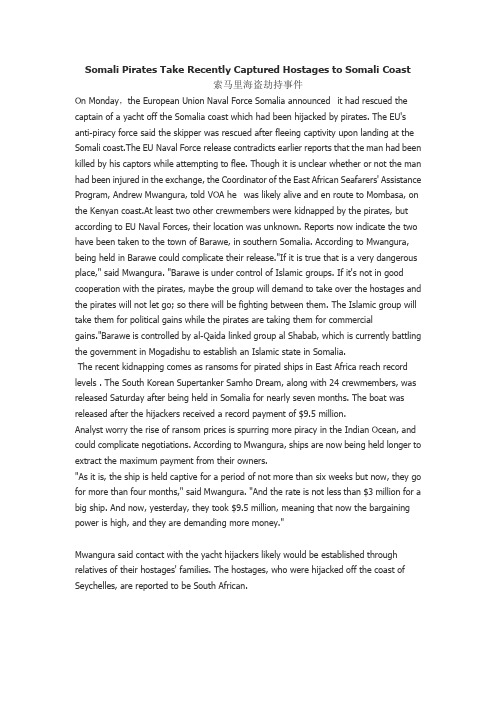
Somali Pirates Take Recently Captured Hostages to Somali Coast索马里海盗劫持事件On Monday,the European Union Naval Force Somalia announced it had rescued the captain of a yacht off the Somalia coast which had been hijacked by pirates. The EU's anti-piracy force said the skipper was rescued after fleeing captivity upon landing at the Somali coast.The EU Naval Force release contradicts earlier reports that the man had been killed by his captors while attempting to flee. Though it is unclear whether or not the man had been injured in the exchange, the Coordinator of the East African Seafarers' Assistance Program, Andrew Mwangura, told VOA he was likely alive and en route to Mombasa, on the Kenyan coast.At least two other crewmembers were kidnapped by the pirates, but according to EU Naval Forces, their location was unknown. Reports now indicate the two have been taken to the town of Barawe, in southern Somalia. According to Mwangura, being held in Barawe could complicate their release."If it is true that is a very dangerous place," said Mwangura. "Barawe is under control of Islamic groups. If it's not in good cooperation with the pirates, maybe the group will demand to take over the hostages and the pirates will not let go; so there will be fighting between them. The Islamic group will take them for political gains while the pirates are taking them for commercial gains."Barawe is controlled by al-Qaida linked group al Shabab, which is currently battling the government in Mogadishu to establish an Islamic state in Somalia.The recent kidnapping comes as ransoms for pirated ships in East Africa reach record levels . The South Korean Supertanker Samho Dream, along with 24 crewmembers, was released Saturday after being held in Somalia for nearly seven months. The boat was released after the hijackers received a record payment of $9.5 million.Analyst worry the rise of ransom prices is spurring more piracy in the Indian Ocean, and could complicate negotiations. According to Mwangura, ships are now being held longer to extract the maximum payment from their owners."As it is, the ship is held captive for a period of not more than six weeks but now, they go for more than four months," said Mwangura. "And the rate is not less than $3 million for a big ship. And now, yesterday, they took $9.5 million, meaning that now the bargaining power is high, and they are demanding more money."Mwangura said contact with the yacht hijackers likely would be established through relatives of their hostages' families. The hostages, who were hijacked off the coast of Seychelles, are reported to be South African.。
- 1、下载文档前请自行甄别文档内容的完整性,平台不提供额外的编辑、内容补充、找答案等附加服务。
- 2、"仅部分预览"的文档,不可在线预览部分如存在完整性等问题,可反馈申请退款(可完整预览的文档不适用该条件!)。
- 3、如文档侵犯您的权益,请联系客服反馈,我们会尽快为您处理(人工客服工作时间:9:00-18:30)。
BOOSAASO, Somalia —This may be one of the most dangerous towns in Somalia, a place where you can get kidnapped faster than you can wipe the sweat off your brow. But it is also one of the most prosperous.
Money changers walk around with thick wads of hundred-dollar bills. Palatial new houses are rising up next to tin-roofed shanties. Men in jail reminisce, with a twinkle in their eyes, about their days living like kings.
This is the story of Somalia’s booming, not-so-underground pirate economy. The country is in chaos, countless children are starving and people are killing one another in the streets of Mogadishu, the capital, for a handful of grain.
But one particular line of work —piracy —seems to be benefiting quite openly from all this lawlessness and desperation. This year, Somali officials say, pirate profits are on track to reach a record $50 million, all of it tax free.
“These guys are making a killing,”said Mohamud Muse Hirsi, the top Somali official in Boosaaso, who himself is widely
suspected of working with the pirates, though he vigorously denies it.
More than 75 vessels have been attacked this year, far more than any other year in recent memory. About a dozen have been set upon in the past month alone, including a Ukrainian freighter packed with tanks, antiaircraft guns and other heavy weaponry, which was brazenly seized in September.
The pirates use fast-moving skiffs to pull alongside their prey and scamper on board with ladders or sometimes even rusty grappling hooks. Once on deck, they hold the crew at gunpoint until a ransom is paid, usually $1 million to $2 million. Negotiations for the Ukrainian freighter are still going on, and it is likely that because of all the publicity, the price for the ship could top $5 million.
In Somalia, it seems, crime does pay. Actually, it is one of the few industries that does.
“All you need is three guys and a little boat, and the next day you’re millionaires,”said Abdullahi Omar Qawden, a former captain in Somalia’s long-defunct navy.
People in Garoowe, a town south of Boosaaso, describe a certain high-rolling pirate swagger. Flush with cash, the pirates drive
the biggest cars, run many of the town’s businesses —like hotels —and throw the best parties, residents say. Fatuma Abdul Kadir said she went to a pirate wedding in July that lasted two days, with nonstop dancing and goat meat, and a band flown in from neighboring Djibouti.
“It was wonderful,”said Ms. Fatuma, 21. “I’m now dating a pirate.”
This is too much for many Somali men to resist, and criminals from all across this bullet-pocked land are now flocking to Boosaaso and other notorious pirate dens along the craggy Somali shore. They have turned these waters into the most dangerous shipping lanes in the world.
With the situation clearly out of control, warships from the United States, Russia, NATO, the European Union and India are steaming into Somalia’s waters as part of a reinvigorated, worldwide effort to crush the pirates.
But it will not be easy. The pirates are sea savvy. They are fearless. They are rich and getting richer, with the latest high-tech gadgetry like handheld GPS units. And they are united. The immutable clan lines that have pitted Somalis against one another for
decades are not a problem here. Several captured pirates interviewed in Boosaaso’s main jail said that they had recently crossed clan lines to open new, lucrative, multiclan franchises.
1 2 3 4 5 推荐:每日新闻(10.14):IBM打造网上“虚拟故宫”
每日新闻(10.8):纽约:经济危机殃及餐饮业
每日新闻(10.3):美丽的画面可减轻病痛
Bao:How will I be able to call you?
Jim:I will give you a contact number.
Bao:Is this your cell phone number?
Jim:Yes. I always answer my cell phone.
鲍:我要如何找你呢?
金:我会给你一个联络电话。
鲍:这是你的手机号码吗?
金:我一向都会接手机的。
解说:
contact number "联络电话"的意思. 很有用吧! 所以想跟别人要联络电话时, 该怎么说呢? 很简单, 你可以用Do you have a contact number? "您有联络电话吗?".
例句:
Do you have a contact number that I can phone you at?
你有个我能找到你的联络电话吗?
推荐:每日一讲(4.15):cut someone loose
每日一讲(4.25):What have we got here?
每日一讲(5.04):for your information。
